People line up to get on the Air France flight to Paris at OR Tambo International Airport in Johannesburg, South Africa, Friday Nov. 26, 2021. A slew of nations moved to stop air travel from southern Africa on Friday in reaction to news of a new, potentially more transmissible COVID-19 variant that has been detected in South Africa. Scientists say it is a concern because of its high number of mutations and rapid spread among young people in Gauteng, the country's most populous province. (AP Photo/Jerome Delay)
The Associated Press
JOHANNESBURG (AP) - As the world grapples with the emergence of the new highly transmissible variant of COVID-19, worried scientists in South Africa - where omicron was first identified - are scrambling to combat its lightning spread across the country.
In the space of two weeks, the omicron variant has sent South Africa from a period of low transmission to rapid growth of new confirmed cases. The country's numbers are still relatively low, with 2,828 new confirmed cases recorded Friday, but omicron's speed in infecting young South Africans has alarmed health professionals.
'œWe're seeing a marked change in the demographic profile of patients with COVID-19,'ť Rudo Mathivha, head of the intensive care unit at Soweto's Baragwanath Hospital, told an online press briefing.
'œYoung people, in their 20s to just over their late 30s, are coming in with moderate to severe disease, some needing intensive care. About 65% are not vaccinated and most of the rest are only half-vaccinated,'ť said Mathivha. 'œI'm worried that as the numbers go up, the public health care facilities will become overwhelmed.'ť
She said urgent preparations are needed to enable public hospitals to cope with a potential large influx of patients needing intensive care.
'œWe know we have a new variant,'ť said Mathivha. 'œThe worst case scenario is that it hits us like delta ... we need to have critical care beds ready.'ť
What looked like a cluster infection among some university students in Pretoria ballooned into hundreds of new cases and then thousands, first in the capital city and then to nearby Johannesburg, South Africa's largest city.
Studying the surge, scientists identified the new variant that diagnostic tests indicate is likely responsible for as many as 90% of the new cases, according to South Africa's health officials. Early studies show that it has a reproduction rate of 2 - meaning that every person infected by it is likely to spread it to two other people.
The new variant has a high number of mutations that appear to make it more transmissible and help it evade immune responses. The World Health Organization looked at the data on Friday and named the variant omicron, under its system of using Greek letters, calling it a highly transmissible variant of concern.
'œIt's a huge concern. We all are terribly concerned about this virus,'ť Professor Willem Hanekom, director of the Africa Health Research Institute, told The Associated Press.
'œThis variant is mostly in Gauteng province, the Johannesburg area of South Africa. But we've got clues from diagnostic tests ... that suggest that this variant is already all over South Africa,'ť said Hanekom, who is also co-chair of the South African COVID Variant Research Consortium.
'œThe scientific reaction from within South Africa is that we need to learn as much as soon as possible. We know precious little,'ť he said. 'œFor example, we do not know how virulent this virus is, which means how bad is this disease that it causes?'ť
A key factor is vaccination. The new variant appears to be spreading most quickly among those who are unvaccinated. Currently, only about 40% of adult South Africans are vaccinated, and the number is much lower among those in the 20 to 40-year-old age group.
South Africa has nearly 20 million doses of vaccines - made by Pfizer and Johnson & Johnson - but the numbers of people getting vaccines is about 120,000 per day, far below the government's target of 300,000 per day.
As scientists try to learn more about omicron, the people of South Africa can take measures to protect themselves against it, said Hanekom.
'œThis is a unique opportunity. There's still time for people who did not get vaccinated to go and get the vaccine, and that will provide some protection, we believe, against this infection, especially protection against severe infection, severe disease and death,'ť he said. 'œSo I would call on people to vaccinate if they can.'ť
Some ordinary South Africans have more mundane concerns about the new variant.
'œWe've seen increasing numbers of COVID-19, so I've been worried about more restrictions,'ť said Tebogo Letlapa, in Daveyton, eastern Johannesburg. 'œI'm especially worried about closing of alcohol sales because it's almost festive season now.'ť
___
AP journalist Mogomotsi Magome contributed from Johannesburg.
People line up to get on an overseas flight at OR Tambo International Airport in Johannesburg, South Africa, Friday Nov. 26, 2021. A slew of nations moved to stop air travel from southern Africa on Friday in reaction to news of a new, potentially more transmissible COVID-19 variant that has been detected in South Africa. Scientists say it is a concern because of its high number of mutations and rapid spread among young people in Gauteng, the country's most populous province. (AP Photo/Jerome Delay)
The Associated Press
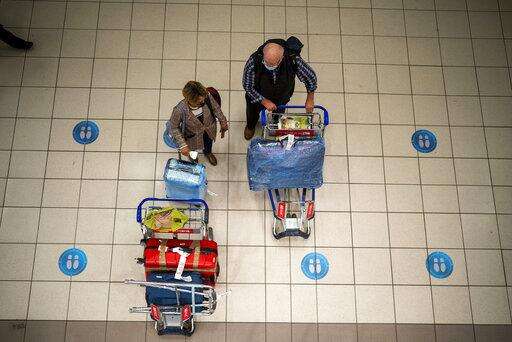
People wait at OR Tambo's airport in Johannesburg, South Africa', Friday Nov. 26, 2021. A slew of nations moved to stop air travel from southern Africa on Friday in reaction to news of a new, potentially more transmissible COVID-19 variant that has been detected in South Africa. Scientists say it is a concern because of its high number of mutations and rapid spread among young people in Gauteng, the country's most populous province. (AP Photo/Jerome Delay)
The Associated Press
FILE - People queue to get on the Air France flight to Paris at OR Tambo's airport in Johannesburg, South Africa, Nov. 26, 2021. As the world grapples with the emergence of the new highly transmissible variant of COVID-19, worried scientists in South Africa - where omicron was first identified - are scrambling to combat its lightning spread across the country. (AP Photo/Jerome Delay, File)
The Associated Press
People lineup to get on the Air France flight to Paris at OR Tambo's airport in Johannesburg, South Africa', Friday Nov. 26, 2021. A slew of nations moved to stop air travel from southern Africa on Friday in reaction to news of a new, potentially more transmissible COVID-19 variant that has been detected in South Africa. Scientists say it is a concern because of its high number of mutations and rapid spread among young people in Gauteng, the country's most populous province. (AP Photo/Jerome Delay)
The Associated Press
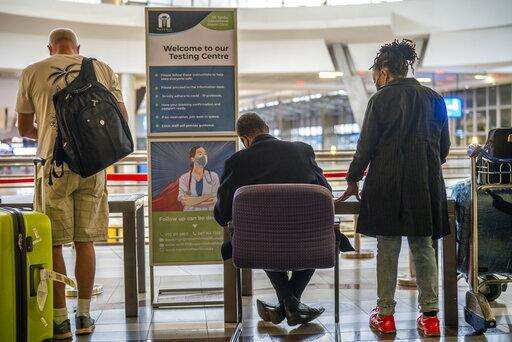
People lineup to get tested for Covid at OR Tambo's airport in Johannesburg, South Africa', Friday Nov. 26, 2021. A slew of nations moved to stop air travel from southern Africa on Friday in reaction to news of a new, potentially more transmissible COVID-19 variant that has been detected in South Africa. Scientists say it is a concern because of its high number of mutations and rapid spread among young people in Gauteng, the country's most populous province. (AP Photo/Jerome Delay)
The Associated Press
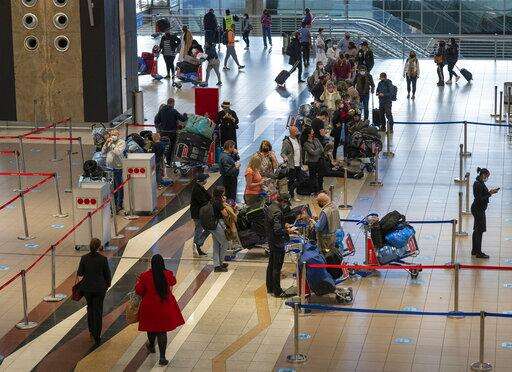
People lineup to get on the Air France flight to Paris at OR Tambo's airport in Johannesburg, South Africa', Friday Nov. 26, 2021. A slew of nations moved to stop air travel from southern Africa on Friday in reaction to news of a new, potentially more transmissible COVID-19 variant that has been detected in South Africa. Scientists say it is a concern because of its high number of mutations and rapid spread among young people in Gauteng, the country's most populous province. (AP Photo/Jerome Delay)
The Associated Press

People lineup to get on the Air France flight to Paris at OR Tambo's airport in Johannesburg, South Africa', Friday Nov. 26, 2021. A slew of nations moved to stop air travel from southern Africa on Friday in reaction to news of a new, potentially more transmissible COVID-19 variant that has been detected in South Africa. Scientists say it is a concern because of its high number of mutations and rapid spread among young people in Gauteng, the country's most populous province. (AP Photo/Jerome Delay)
The Associated Press
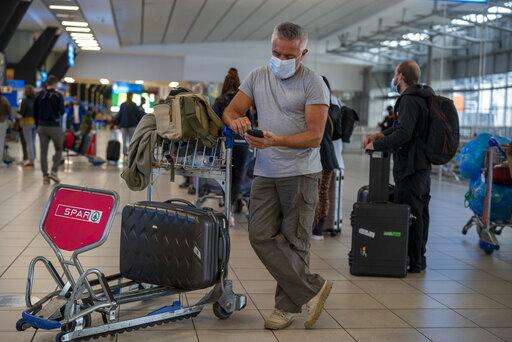
People lineup to get on the Air France flight to Paris at OR Tambo's airport in Johannesburg, South Africa', Friday Nov. 26, 2021. A slew of nations moved to stop air travel from southern Africa on Friday in reaction to news of a new, potentially more transmissible COVID-19 variant that has been detected in South Africa. Scientists say it is a concern because of its high number of mutations and rapid spread among young people in Gauteng, the country's most populous province. (AP Photo/Jerome Delay)
The Associated Press
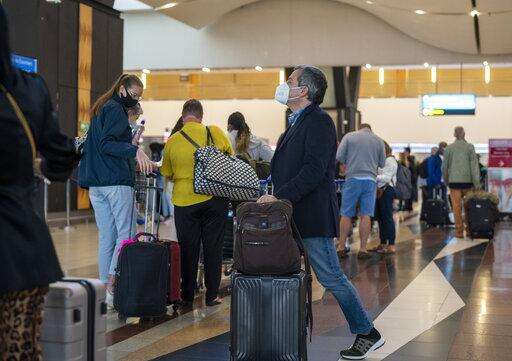
People lineup to get on the Air France flight to Paris at OR Tambo's airport in Johannesburg, South Africa', Friday Nov. 26, 2021. A slew of nations moved to stop air travel from southern Africa on Friday in reaction to news of a new, potentially more transmissible COVID-19 variant that has been detected in South Africa. Scientists say it is a concern because of its high number of mutations and rapid spread among young people in Gauteng, the country's most populous province. (AP Photo/Jerome Delay)
The Associated Press